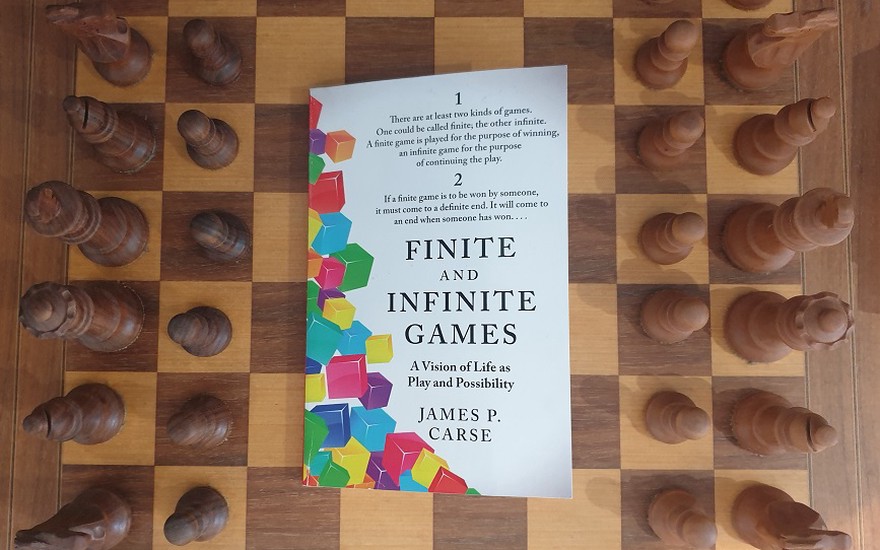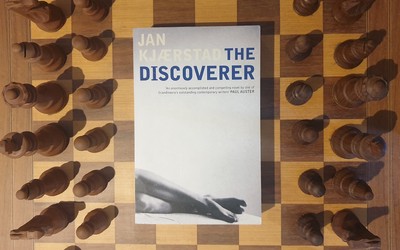
#32: Book review: Finite and Infinite Games
5 stars! Do you play chess as a finite or infinite game?When you play a game of chess, you want to win.
The act of playing chess, though, can be an end in itself.
Carse wrote that infinite games can contain finite games, but not vice versa.
Some players see wins and losses as winning or losing in life.
Others accept wins and losses as inevitable occurrences in one of life’s games.
For many players, there comes a time when they question why they play, and may need to rethink their why.
For some, it might be when they’ve achieved their ultimate goal.
For some, it might be when they realise they might not achieve their ultimate goal.
And for others, it might be because they find other, more interesting games to play.
14
To be playful is not to be trivial or frivolous, or to act as though nothing of consequence will happen.
[...]
It is, in fact, seriousness that closes itself to consequence, for seriousness is a dread of the unpredictable outcome of open possibility. To be serious is to press for a specified conclusion. To be playful is to allow for possibility whatever the cost to oneself.
Playful players may enjoy the overarching game of life more.
But serious players may be more likely to win in each game.
17
To be prepared against surprise is to be trained. To be prepared for surprise is to be educated.
To increase the known, to increase the skill in the unknown.
While the latter is a more critical skill, the former can also be done playfully.
Carse writes that society strives “to validate titles and to assure their perpetual recognition.”
Would you try harder in other games if you could also attain titles in them for life?
For many players, there comes a time when they reach their limits, whether real or self-imposed. One could say the Level: Difficult in the game is then finally unlocked.
DALL-E
27
Inasmuch as power is determined by the outcome of a game, one does not win by being powerful; one wins to be powerful. If one has sufficient power to win before the game has begun, what follows is not a game at all.
One’s power can only be known through playing a lot and over a long period of time.
While how powerful players are is shown through one number, what may attract you to the way certain players play the game may be through some qualities that are difficult to quantify—those, however, which you can intuitively assess and appreciate.
Do you ever change or evolve as a player, or are you always the same person?
From the dimensions of the board, to the way pieces move—does whatever decided arbitrarily, nevertheless become something necessary over enough time and trials?
67
We look on childhood and youth as those “times of life” rich with possibility only because there still seem to remain so many paths open to a successful outcome. Each year that passes, however, increases the competitive value of making strategically correct decisions. The errors of childhood can be more easily amended than those of adulthood.
What are the similarities and differences between the openings, middlegames and endgames of those in chess and life?
84
Machines do not, of course, make us into machines when we operate them; we make ourselves into machinery in order to operate them. Machinery does not steal our spontaneity from us; we set it aside ourselves, we deny our originality. There is no style in operating a machine. The more efficient the machine, the more it either limits or absorbs our uniqueness into its operation.
How can we utilise increasingly powerful engines to improve our chess, while also respecting the human imagination, resourcefulness and capacity to evolve?
irasutoya
What games do you play as a finite/infinite player?
One of the most interesting non-fiction books I’ve read.
Carse put everything into the context of finite and infinite games—not only activities which can be easily perceived as games, but notions such as society and culture, debate and grammar, theatre and drama, past and future, candour and vulnerability, training and education, titles and names, death in life and life in death, contradictions and paradox, power and strength, rules and deviations, seriousness and playfulness, knowing and learning, machines and gardens, amplification and resonance, actors and poets. A book that nudges you to reflect on how you play different games, and the game of life—through the lens of finite and infinite play.
Thanks for reading. If you'd like to receive posts like this in your inbox, you can subscribe to my free newsletter, Infinite Chess at https://juntaikeda.substack.com/, now with over 1000 readers.
More blog posts by datajunkie

#33: My Most Memorable Novelty
The joy of charting unexplored territory
#31: How to think on your opponent's turn
I asked 3 grandmasters what they do
#30: And Then There Were None
Lichess version